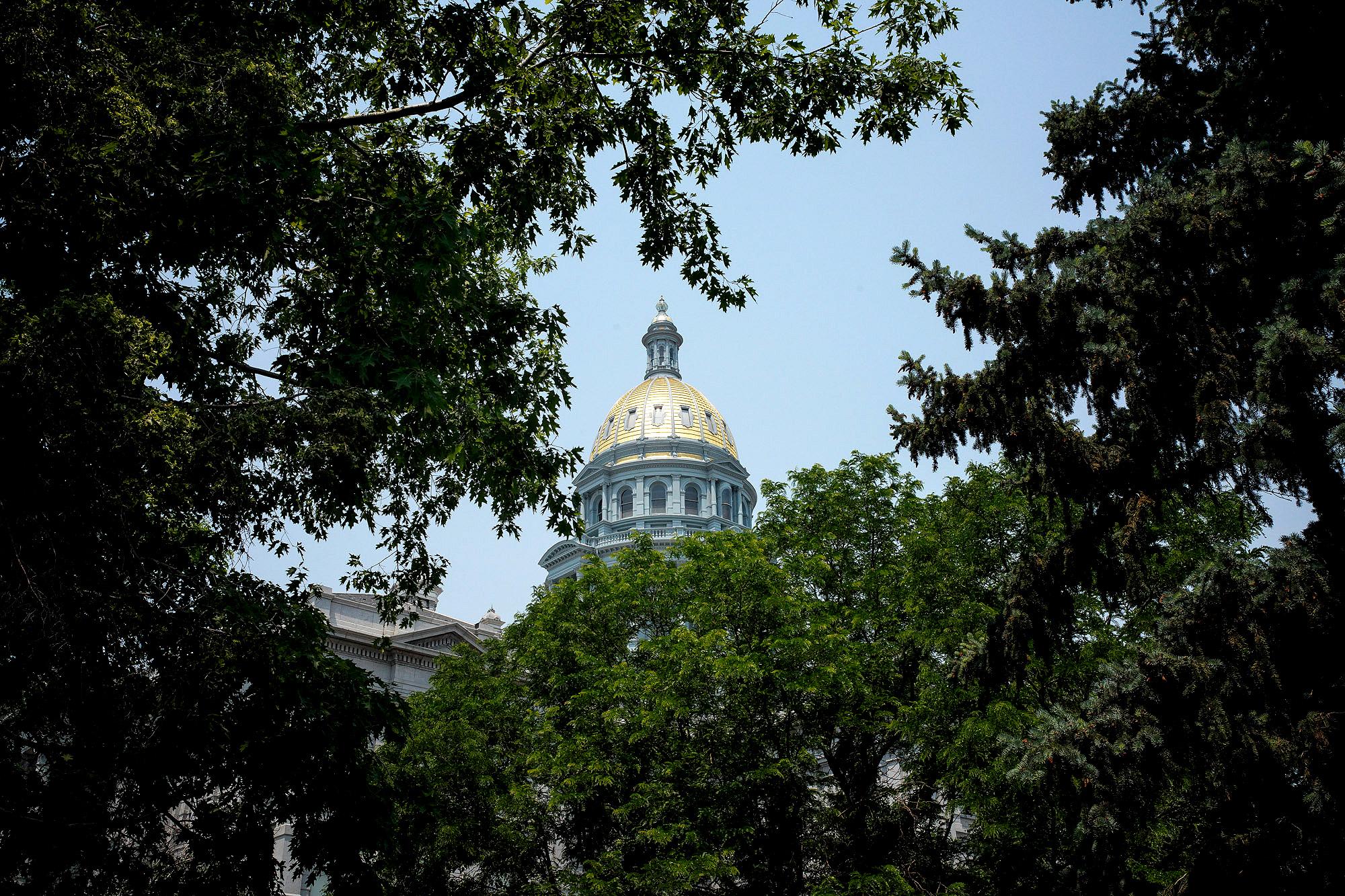
Heidi Ganahl, the Republican candidate for governor, wants to eliminate the state’s personal income tax and cut gas taxes by half. At a forum before one of the state’s most influential business groups, the debate over that sweeping idea came to a fine point.
Moderator Dean Singleton, the former publisher of The Denver Post, told Ganahl that her idea was B.S. — actually, he used the full expletive — because of its enormous potential effects on the state’s budget.
Ganahl responded: “Well, a lot of people across Colorado think the government’s total (B.S.) right now.”
The interaction — coming after Singleton had pressed Ganahl multiple times to go into more detail on her plans — put a foul-mouthed point on a policy debate that has run throughout Colorado’s political cycle this year.
Ganahl’s campaign promise to cut the income tax has been perhaps the biggest single policy plank in her platform. It’s also been an area of some uncommon agreement between her and Gov. Jared Polis, the incumbent. Polis similarly thinks the income tax is a fundamentally flawed way to pay for government, though the two candidates diverge sharply on their approach to taxes overall.
At the same time, voters also will weigh in on a smaller proposed cut to the income tax — one that could likely pass. And no matter who wins the governor’s race, the campaign shows that battles over the state’s income tax are likely to continue for years to come.

Ganahl’s tax-slashing plan
Ganahl has attracted attention and criticism for the expansive scope of her plan. She has proposed entirely eliminating the state’s income tax — dropping it from 4.55 percent to zero over a number of years — while also cutting the gas tax in half from its current rate of 22 cents per gallon.
If it were implemented today, the income tax proposal would mean the loss of at least $11 billion in revenues — making up a large majority of the state’s general fund.
Ganahl says the state government needs a major haircut, since the general fund has nearly doubled in size over the last ten years. (At the same time, inflation and population growth have driven up the state’s costs.)
“Guys, are you getting twice the amount of services from the government in the last 10 years?” she said. “Is $40 billion dollars the right number to spend on running our state? That's ridiculous. We can cut spending, we can still provide services that we should provide to the people of Colorado.”
Meanwhile, Polis has attacked the plan as dangerous.
“My opponent talks about eliminating it without replacing it with anything,” he said. “That would absolutely completely undermine funding for our schools, our prisons, our roads. Colorado would become a less safe place, a more dangerous place and a place where our schools would rank last in the country.”
Ganahl said the cut could be implemented over two terms as governor, or perhaps more quickly by a ballot measure.
To pay for the change, she suggested the state could attract new businesses and, most notably, slash government spending by 10 percent each year. She said she would start by cutting spending at departments like the state public health agency.
Polis hates the income tax, too, but …
Like Ganahl, Polis sees the income tax as a penalty on making money. But that’s about the end of their agreement on the topic. Polis believes if the income tax were abolished, the state would need to replace the funding with another source of money.
“I share the goal of reducing the income tax with my opponent, but we need to do it in a way that adds up because I believe in math,” he said.
He has suggested a tax on carbon emissions as a replacement, since it would penalize something that is undesirable — pollution — instead of punishing people for earning money.
Polis has acknowledged that the carbon tax is an idea “on the margins,” not a central priority for a second term. However, he’s also supportive of a shorter-term change to income taxes: Prop. 121, the measure that would reduce the state’s income tax by about $400 million per year.
The proposition has frustrated for some of Polis’ allies, who think the state can’t afford to give up revenue as it faces a potential recession.
“That is gonna take significant resources away from future budgets. And we're already behind,” said Democratic Sen. Chris Hansen, vice chair of the Joint Budget Committee. He warned that TABOR revenue limits, combined with the threat of recession, will make for tough budget decisions next year.

Other states have zero income taxes.
A state can indeed function without an income tax. Nine states — including Florida, Texas, Washington and Wyoming — have zero or extremely limited income taxes.
“They’re some of the most prosperous states in the country,” Ganahl said in an interview.
Colorado has the nation’s 27th highest income tax burden, according to WalletHub.
Those other states are able to have lower income taxes, in some cases, by relying more heavily on other taxes. For example, Florida’s state sales tax rate is 6 percent, more than twice Colorado's rate.
Most of those zero-income states have smaller-than-average government budgets, too, according to data from the Kaiser Family Foundation. While Colorado spent about $6,100 per resident in fiscal 2020, Florida spent only $4,000. (The national average was about $6,900.)
The states without an income tax have generally built their governments around that structure for many years. But Ganahl said it’s still possible to transition, pointing to Tennessee’s recent elimination of its tax on some forms of income.
“We can do that here in Colorado,” she said at a recent debate.
But Colorado and Tennessee’s income taxes are very different. Tennessee’s former income tax applied only to interest and dividends — worth about $300 million a year, a small fraction of that state’s overall budget, and far short of the billions of dollars that Colorado gets from income taxes.
Eliminating the income tax in Colorado would require the support of the state legislature, which is currently dominated by Democrats, if it was done by legislation, or a majority of voters, if a group chose to put it on the ballot.
That may not happen anytime soon — but Colorado voters are likely to see many more smaller tax tweaks and changes on their ballots in the elections to come.









